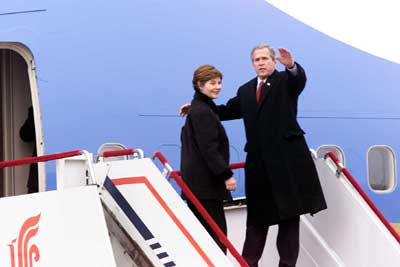【美国总统电台演说】2005-11-19
时间:2019-01-08 作者:英语课 分类:美国总统电台演说
【美国总统电台演说】2005-11-19
THE PRESIDENT: Good morning. I am currently traveling in Asia on a trip to Japan, South Korea, China, and Mongolia. I'm visiting with friends and allies in the region to discuss issues vital to the future of all Americans.
One important issue for American workers, entrepreneurs, businesses, and farmers is to access foreign markets for our goods, services, and farm products. At the Asia Pacific Economic Cooperation meeting in South Korea, we have advanced America's case for free and fair trade.

The leaders of the 20 other Asian-Pacific member economies join the United States in a strong statement aimed at moving forward the Doha round of negotiations 1 at the World Trade Organization. By pushing for a successful conclusion to the trade talks, Asian Pacific leaders are working with us toward the goal of a freer and fairer global trading system, which will benefit America and other nations around the world.
I'm also raising the issue of free and fair trade and open markets in my one-on-one meetings with other leaders. In my discussions with Prime Minister Koizumi of Japan, I urged him to lift his nation's ban on American beef. The Prime Minister assured me that we are making good progress on this issue. Japan's food safety commission has ruled that beef from young American cattle is safe. I expect that the Japanese government will follow through on the recommendations of the commission so that America's beef industry and cattlemen will have access to a market that has been closed to them for almost two years.
I will also raise important trade issues on Sunday during my meeting in Beijing with President Hu of China. Access to American markets has played an important role in China's economic development. And China needs to provide a level playing field for American farmers and businesses seeking access to China's market. The United States supported China's membership in the World Trade Organization because we believe that the cause of free and fair trade is advanced if China plays by the same global rules as everyone else.
When I met with President Hu in New York earlier this year, he said that China would bring more balance to our trade and protect intellectual property rights. I welcomed those commitments, just as I welcomed China's announcement in July that it would implement 2 a flexible market-based exchange system for its currency. These statements are a good beginning, but China needs to take action to ensure these goals are fully 3 implemented 4.
The textile agreement our two nations recently reached shows that with hard work and determination, we can come together to resolve difficult trading issues. The agreement adds certainty and predictability for businesses in both America and China. I look forward to frank discussions on Sunday with President Hu about our need to find solutions to our trade differences with China.
America is drawn 5 by trade and values and history to be part of Asia's future. The extraordinary economic growth of the Asia Pacific region has delivered prosperity to millions of people, and it has created many new opportunities for American workers, farmers, and businesses. America is a nation founded on the idea of open exchange. And we know that free and fair trade benefits all sides.
We also know that American workers can compete with anybody, any time, anywhere when the rules are fair. By opening new markets, we will create more good jobs in America. By ensuring fair access for American goods and services and securing intellectual property rights, we will level the playing field for our workers, farmers, and businesses. And by working for free and fair trade, we will help deliver a better life for all Americans and advance the cause of peace and prosperity in the world.
Thank you for listening.
END
- negotiations for a durable peace 为持久和平而进行的谈判
- Negotiations have failed to establish any middle ground. 谈判未能达成任何妥协。
- Don't undertake a project unless you can implement it.不要承担一项计划,除非你能完成这项计划。
- The best implement for digging a garden is a spade.在花园里挖土的最好工具是铁锹。
- The doctor asked me to breathe in,then to breathe out fully.医生让我先吸气,然后全部呼出。
- They soon became fully integrated into the local community.他们很快就完全融入了当地人的圈子。
- This agreement, if not implemented, is a mere scrap of paper. 这个协定如不执行只不过是一纸空文。 来自《现代汉英综合大词典》
- The economy is in danger of collapse unless far-reaching reforms are implemented. 如果不实施影响深远的改革,经济就面临崩溃的危险。 来自辞典例句